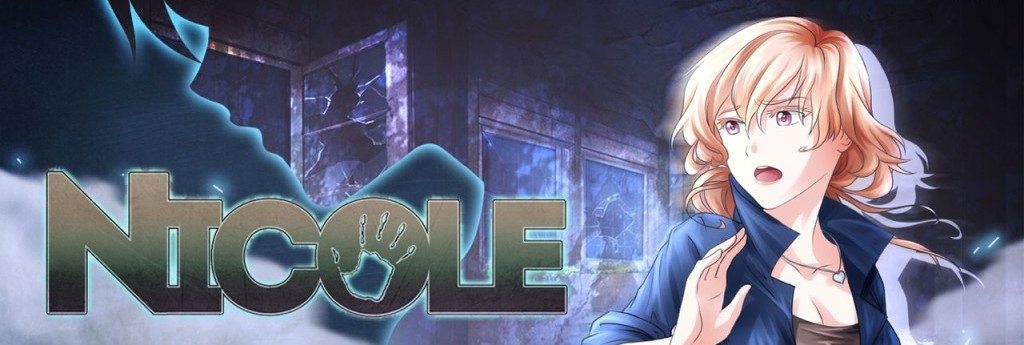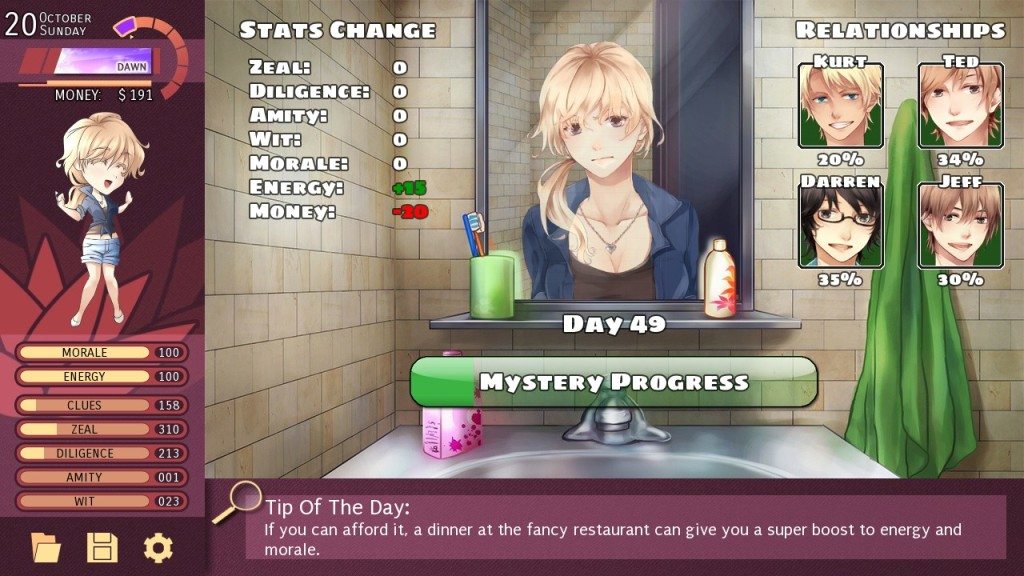Review: Nicole
What’s the time, Mr Wolf?
Well, reader, it’s wolf time – specifically, Winter Wolves time. With Easter fully upon us, the illustrious indie anime game company that spawned Heileen and Always Remember Me have benevolently initiated a week-long sale on all titles, excluding their newest dating sim, Roommates. At discount prices of £7, it was too delicious an offer to resist, and so it came to pass that Nicole, an otome visual novel with mystery elements, descended on my computer.
[divider]
It’s been a few years since my first encounter with the dating sims of Winter Wolves, but playing ARM I was struck by the overall quality of sound, plot and vibrant character design which proved a true testament to the dedication of the game’s developers. Naturally, I anticipated the same consistency and quality of experience from Nicole, as being developed by the same team it should have easily passed the bar had it stuck to the winning formula – in theory. Somewhat disappointingly, however, it barely manages to cling to a good reputation by a thread – a bacterial-thin thread, might I add.
Regardless of what it claims to be, Nicole is predominantly a stat-building dating sim, seasoned with a pinch of mystery. Our protagonist arrives at her dream university only to discover that it has been shaken by a string of mysterious disappearances, and as she begins to investigate, she becomes the kidnapper’s fourth target. Analysing the calibre of the game based on its trailer and the blurb, and actually experiencing it, however, are two different matters. Nicole seems to suffer from an identity crisis. Primarily marketed as a suspenseful mystery, this is actually the game’s sub-plot, with the main focus being on the romance the heroine develops with the four male leads.
[divider]
Those expecting puzzle-solving elements, or even a touch of personal input into solving the mystery, for that matter, will be severely disappointed, as the only real control the player has over Nicole’s Sherlock skills is ensuring that she stalks enough civilians to maximise the Clues stat by the game’s end to unlock the final scene. Additionally, prepare to settle for a mystery without suspense, as this is what Nicole decides to dish out when it attempts to accommodate both mystery and romance by allowing Nicole to successfully date the kidnapper. The situation results in a rueful attempt to dilute the kidnapper’s crimes so they aren’t so terrible as to make them irredeemable, for fear the romance would flounder. None of the three previously kidnapped girls turn out to have been murdered or even injured, which the blurb fails to mention – they simply reappear after three days, pack up and leave the city. Suddenly this mystery feels more like an episode of Scooby-Doo without the silly costumes. Knowing this, it’s difficult to see exactly which part of the kidnapper’s threats we should be fearful of, when the writer did their utmost to quell any possibility of his being a formidable foe. After I saw the décor in his abandoned hideout, I was convinced he was just a poor, lonely guy in desperate need of company…
This mystery feels more like an episode of Scooby-Doo without the silly costumes
While I understand the writer’s predicament of achieving a balance, I find myself asking why a balance was needed. Winter Wolves had the option of introducing a minor character as the culprit (my money’s always on the gardener or the illegitimate son in Poirot), or better still, turning the actual culprit’s ending into a bombshell bad ending, where Nicole dies and a GAME OVER notice accompanies a fading eerie track. If nothing else, it would have made for a more memorable and frightening experience, one worth revisiting.
Though an abundance of plot-holes lay in the wake of the mystery’s arrangement, such as the very unlikely gall of any heroine to take it upon herself to investigate (but hey, we’ve already established there’s no danger in doing so) and the dubious competence of a police force which, as we’re led to believe, sit twiddling their thumbs as a teenager solves their crimes for them, each of these holes fall short of impairing the player’s enjoyment of the sub-plot. As long as it’s taken with a pinch of salt, the desire to unmask the kidnapper can soon override everything else during a first playthrough.
Nicole’s plot was not what I had expected, and neither was its fiery heroine. At times, Nicole Graves exhibits an extreme case of vacuous femininity and during the mystery plot scenes does her best to live up to the blonde victim of every bad horror film. Having said that, she comes into her own by having enough guts to confront the kidnapper and giving each guy a slap across the face when it’s high time they pulled themselves back to reality. Nicole has a strange blend of what are usually polar opposites in otome visual novels, fighting spirit and fashion sense, and for that she shines as the most unique and interesting character of the entire game.
In-game artwork remains very much consistent with that of ARM, and for good reason – it has always carried Winter Wolves games as being exceptionally beautiful to look at. Zephylla’s character design is uniquely stamped with a gorgeous softened stroke and multi-toned shading, and makes Nicole a pleasure to experience, if only as a gallery of Zephylla’s works. The game’s soundtracks are also an enormous drawing point, being one thing that has built upon ARM and improved significantly. While ARM’s sung theme tune was at best dodgy, Nicole relies on instrumental tracks only, all of which are well-orchestrated. During the mystery plot they also succeed at being atmospheric, even if the story does not.
 Nicole’s saving grace is its interaction events with the male characters, which are written beautifully and expose the compelling characters of Nicole’s four romance candidates: Darren, Jeff, Kurt and Ted. As with all in this genre, each one comes with his own significant flaws and baggage, and truth be told, it was refreshing to play a visual novel that wasn’t afraid to be realistic to the point of presenting the ugly truth. Additionally, instead of being random, the stat-building element of the game has been given definitive purpose, as each of the four stats (Zeal, Diligence, Amit and Wit) is an attribute that will eventually be needed to help Nicole tug the guys from their slumps.
Nicole’s saving grace is its interaction events with the male characters, which are written beautifully and expose the compelling characters of Nicole’s four romance candidates: Darren, Jeff, Kurt and Ted. As with all in this genre, each one comes with his own significant flaws and baggage, and truth be told, it was refreshing to play a visual novel that wasn’t afraid to be realistic to the point of presenting the ugly truth. Additionally, instead of being random, the stat-building element of the game has been given definitive purpose, as each of the four stats (Zeal, Diligence, Amit and Wit) is an attribute that will eventually be needed to help Nicole tug the guys from their slumps.
For this, and during the first playthrough, I had concluded it was money well spent. It was pleasantly surprising to find the designers had even anticipated a greener player base and added activity tutorials and multiple difficulty settings. But then I began a second game.
It isn’t one, but two problems that, combined, dashes any hope of the game’s replay-value. Firstly, Nicole is plagued by a frustratingly simplistic set of stat mechanics. You need only build one stat to romance that stat’s respective male. In other words, the player will spend the entire game grinding the same activity to increase one stat. Yes, yes, you are correct – that is incredibly tedious. Infinitely more so is the added fact that the game stretches over a period of four months, yet you could max out your stats over a month before running the risk of being abducted by the kidnapper. It’s so monotonously simple you will always eventually find yourself bumbling along, hibernating all day for a whole month because there’s nothing else to do except wait for a plot point to trigger. Surely you know your game is too long if you have to make a maximum stat value of 999, Winter Wolves?
All this means that the romance interactions that should have made this game another brilliant feather in Winter Wolves’ cap are sadly undermined. No matter how much you may have cared for the story in the beginning, eventually you will lose interest due to the pure monotony of grinding that devours three-quarters of this game.
Ultimately, I did enjoy Nicole. On the whole, it isn’t a terrible newcomer in the otome genre, but neither is it without its fair share of problems, and a better game with less glaring design faults would be far worthier of a £7 discount price, and certainly worthier of Nicole’s £14 usual price. Nevertheless, behind the clutter does in fact lie a very competent dating sim, so by appreciating Nicole for what it is – a dating sim – and not what it tries to be, amusement can be gleamed from it.

[divider]



Comments (1)
Good review! The stat-raising was really drawn out in Nicole. More so than usual for a stat-raiser. The fact that you have to click multiple frames each time to raise a single stat makes it even more tedious.
My biggest gripe with the game: The main character, Nicole. Multiple times in the game she complains about how people (in her childhood high school) assumed she was a blond airhead. Honestly I am not surprised. Dull jokes, incessant worrying about the most mundane and trivial of issues and blunt acknowledgements to her suitors that she doesn’t get what they are trying to say half the time are run-of-the-mill for Nicole. Given that a large chunk of the game’s dialogue is Nicole’s internal musings, players are forced to slog through pages of this vacuous girl’s personality.
I liked that each of the guys had clear personality flaws but at times it seemed like these defects swallowed up the characters themselves rather than formed a part of them. This isn’t made any better by the fact that Nicole feels the need to spout patronising advice either directly to the poor boys themselves or mentally to the players before switching back to her usual dim self.
Finally, the choices presented throughout the dialogue seem shallow and do little to direct the story itself. This is made even worse by how illogical or silly some of the choices presented to the reader are: How on earth are we supposed to know which dessert options a guy will like or dislike without any prior hints? Why is it better to tell the shy love interest that you are shocked that his real personality is the opposite of his cool online persona as opposed to saying that you don’t care that he isn’t as slick IRL? Given that choices form the core of the gameplay outside of tedious stat-raising it is important they are properly designed.
Nicole isn’t without some merits. As the article notes, the artwork is lovely. I initially disliked it but it quickly grew on me. I like how the one typical uber-friendly love interest is subverted in Nicole, even if the result is a really cheesy creeper of a guy. The story would have been nice, were it not for the blatant give-away at the start of the game as to who the mystery culprit is and the plot holes which fly at you right from the intro (because you know, any freshman arriving at their new uni is going to casually pencil in solving the local kidnapping cases into their regular varsity schedule).
Nicole is so frustrating because it is has the foundation to be a great dating sim/VN but fails due to the above-mentioned issues. I want to recommend Nicole but I just can’t.